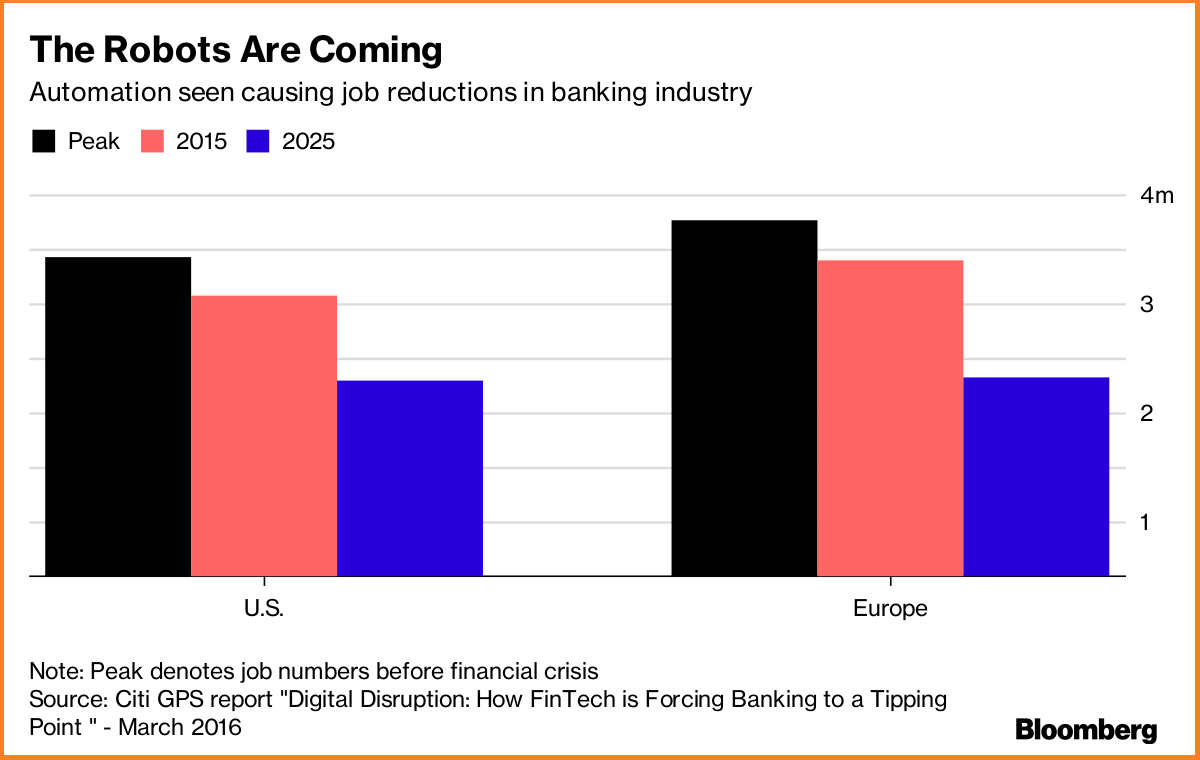In a Singapore interview with Bloomberg Television’s Haslinda Amin, Pandit said “Everything that happens with artificial intelligence, robotics and natural language — all of that is going to make processes easier,” adding “It’s going to change the back office.”
Former Citi CEO Vikram Pandit says automation will wipe out 30% of ‘back-office” banking jobs within 5 years. $C pic.twitter.com/j5byJzWSEf
— ZeroPointNow (@ZeroPointNow) September 13, 2017
Banks have already started to roll out automated systems
While Vikram Pandit’s prediction is bad news for back-office employees, banks have already begun to use AI and machine learning in a big way.
From stock picking quants such as those currently under development by iBankCoin (to be rolled out in Exodus), to “robo-advisors” which handle client portfolios deemed too small to justify a costly human broker, to high frequency trading (HFT) algos, to intelligent fraud detection systems which detect and adapt to fraudulent behavior – banks are becoming increasingly reliant on automated systems.
JPMorgan ($JPM) Chase invested $600 millio0n in 2016 for “emerging fintech solutions,” and have been integrating automation wherever possible. The bank is gunning for legal jobs with their “Contract Intelligence” platform (COiN) which “analyze(s) legal documents and extract important data points and clauses.” According to Techmergence.com, manually reviewing 12,000 annual credit agreements requires approximately 360,000 hours. With COiN, the same agreements are able to be reviewed in seconds. How is a recent law school grad with $150k in debt supposed to compete?
Showcasing Innovation: A quick look at how $JPM is using machine learning. #JPMInvestorDay pic.twitter.com/ZxAngU2jTw
— J.P. Morgan (@jpmorgan) February 28, 2017
JPM is also using their “Emerging Opportunities Engine” introduced in 2015 to help identify clients “best positioned for follow-on equity offerings,” and the firm is also rolling out an internal virtual assistant using a ‘natural language interface’ to manage an initial 120,000 employee help-desk requests.
Wells Fargo ($WFC) announced their “Artificial Intelligence Enterprise Solutions” group in February, led by EVP and head of the bank’s Innovation Group, Steve Ellis. Their goals are to “…increase connectivity for the company’s payments efforts, accelerate opportunities with artificial intelligence, and advanced application programming interfaces to corporate banking customers.”
In other words; optimize banking operations currently handled by slow and inefficient humans.
In April, Wells Fargo tested an AI-driven chatbot via Facebook Messenger with several hundred employees. The virtual assistant is designed to provide basic tasks such as resetting passwords and accessing account information.
“AI technology allows us to take an experience that would have required our customers to navigate through several pages on our website, and turn it into a simple conversation in a chat environment. That’s a huge time-saving convenience for busy customers who are already frequent users of Messenger.” – Steve Ellis, head of Wells Fargo’s Innovation Group
Bank of America ($BAC) is jumping into AI with their “intelligent virtual assistant” named Erica – a chatbot which leverages “predictive analytics and cognative messaging” to give financial advice to the firm’s more than 45 million customers. Erica is also a 24/7 mobile banking assistant, available to perform “day-to-day transactions”
Yesterday at #Money2020, @DigitalMMoore revealed innovative new capabilities coming to mobile and ATM. Watch the replay to catch up: pic.twitter.com/G1Tg0ymxbU
— Bank of America News (@BofA_News) October 25, 2016
“We want to be there for customers in the moments that matter most. Incorporating artificial intelligence into our mobile banking offering will help customers manage their simple banking needs more efficiently and consistently, which then allows our specialists in our financial centers to spend more time with customers to understand their more complex needs and help them improve their financial lives.” -Thong Nguyen, president of Retail Banking, Bank of America
Citibank ($C)has invested heavily in startup Feedzai, a fraud detection company which uses AI and “machine based learning” to pour through vast amounts of data and conduct large-scale analyses of potentially fraudulent behavior.
While AI will help banks survive in a world of thinning margins and fierce competition, the back offices of a bank is where many debt-laden graduates grind out their start in the industry – working 14 hour days to claw their way up the ladder. With entry level banking jobs beginning to evaporate, living the dream in finance is about to become much more difficult.
Source Article from http://feedproxy.google.com/~r/blacklistednews/hKxa/~3/MKttJxPtHEw/M.html
Related posts:
Views: 0
 RSS Feed
RSS Feed

















 September 13th, 2017
September 13th, 2017  Awake Goy
Awake Goy 
 Posted in
Posted in  Tags:
Tags: 
















